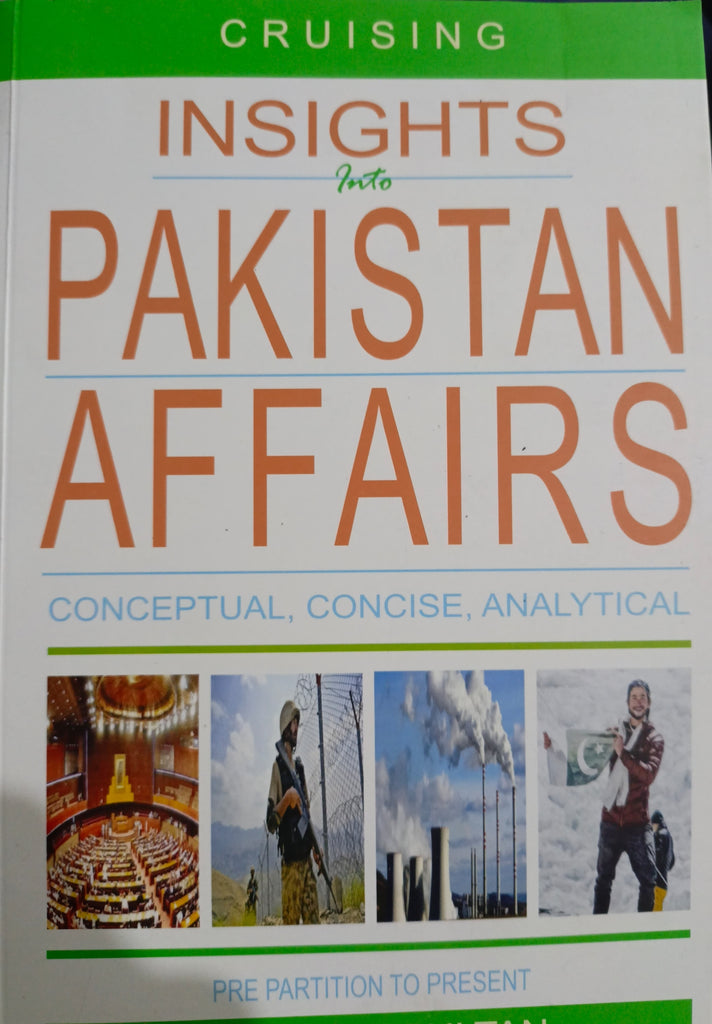Pakistan Affairs (INSIGHTS) By Farrukh Sultan ( Cruising Publisher)
Conceptual, Concise, Analytical,
(Best For Competitive Exams(CSS,PMS,PCS & All Descriptive Exams)
PREFACE
The book in hands on Pakistan Affairs aims to provide a comprehensive overview of the historical and political journey of Pakistan, from its ideological conception to its current-day challenges. Pakistan's story is one of resilience, vision, and transformation, with key figures and events shaping its unique national identity and aspirations. The basic idea behind the effort of connecting the dots and dashes covering the historical patches of political history of Pakistan, tracing back to the Reformation Movement of eighteenth century which may be called as a Renaissance Movement for the Muslims of Sub-continent, steering by great sages of the ages, coming down to the third decade of third millennium, lies in the earnest wish to encapsulate all this historical chain of events in the form of a book that would cater need of the keen readers of history of Pakistan in an authenticated manner and yet to produce the ultimate effort in a plausible and digestible manner. My findings, based on almost twenty years of teaching experience in International Relations, Current Affairs, European History and Pakistan Affairs, transpires that modern day political, strategic or even diplomatic events cannot be comprehensively grasped or understood without having a strong, sound and firm understanding of political struggle of Pakistan.
For the sake of understanding the modern-day political complexities, we should not lose sight of forest for the trees i.e, our understanding of twists and turns of retrospective knowledge should be of higher caliber, magnitude and scale, and that it must be judged through the lenses of impartiality, though it is a relative term. Following independence, Pakistan's political trajectory has been complex, marked by both accomplishments and formidable challenges. Contemporary challenges, from economic pressures and educational reform to counter-terrorism and foreign policy, have shaped Pakistan's evolving role in a globalized world.
This book aims to provide a comprehensive understanding of Pakistan's journey-its genesis, struggles, achievements, and current-day complexities.
By exploring the milestones of the Pakistan Movement, examining the post-independence era, and addressing the modern-day challenges, it hopes to offer readers insight into the multifaceted identity of Pakistan. This is not only a historical account but also an exploration of the aspirations, sacrifices, and hopes that have shaped and continue to shape Pakistan. Through this exploration, readers may gain a deeper appreciation of the forces at play in Pakistan's past, present, and future, fostering a nuanced understanding of a nation whose story is far from over.
Definitely, I owe my great and humble gratitude to all the authors whose original works have been consulted and made a part of this book and who have been mentioned in Reading section. Of course, without the help of theses sources, this book would not have been authentic and even valuable.
I am highy thankful to my parents, my wife and my children who have been a source of great inspiration and encouragement behind my efforts. I am also deeply thankful to my bosom friend Dr. Abdul Saboor(post-doctorate Oxford) for rendering his valuable suggestions towards making this work more comprehensive, diversified and yet precise while taking into account the element of communication potentiality as well. Dr. Abdul Saboor has been a source of inspiration of my last work, titled 'Cruising Modern European History'. He has also been co-author and editor in my other works such as 'The World Today', 'Current Review' 'Current History', 'Current Issues' and 'Crossroads'. I am equally indebted to my friends Naeem A. Butt, Shamsul Hassan and Khwaja Umer for their sincere assistance and valuable input regarding the completion of this book.
Farrukh Sultan
Editor-in-Chief 'The World Today'
Email: sultanfarrukh1995@gmail.com
CONTENTS
Chapter 1 The Pakistan Movement
1.1 Sheikh Ahmad Sarhindi
1.2 Hazrat Shah Waliullah
1.3 Sayyid Ahmad Shaheed
1.4 Sir Syed Ahmed Khan
1.5 Aligarh Movement
1.6 Darul-ul-Uloom Deoband
1.7 Nadwat-ul-Ulama Movement
1.8 Sindh Madressatul Islam
1.9 Islamia College Peshawar
1.10 The Pakistan Movement
Chapter 2 The Ideological Front
2.1 Ideology of Pakistan
2.2 The Rise of Muslim Nationalism in Subcontinent
2.3 Two Nations Theory
2.4 Allama Iqbal and Ideology of Pakistan
2.5 Quaid-i-Azam and Ideology of Pakistan
Chapter 3 Pakistan’s Security Environment
3.1 Pakistan’s National Interest
3.2 Pakistan and Changing Regional Apparatus
3.3 Changing Security Dynamics: Options for Pakistan
3.4 Nuclear Program of Pakistan: International Concerns
3.5 Pakistan’s Traditional and Non-Traditional Security Treats: The Role of Non-State Actors
3.6 National Security: Repercussions of Climate Change in Pakistan
3.7 Proxy Wars: Role of External Elements
Chapter 4 Pakistan and Regional Cooperation Organizations
4.1 South Asian Association for Regional Cooperation (SAARC)
4.2 Shanghai Cooperation Organization (SCO)
4.3 Economic Cooperation Organization (ECO)
Chapter 5 Pakistan and Socio-Economic Challenges
5.1 Pakistan’s Energy Security
5.2 Hydro Politics; Water Issues in Regional Context of Pakistan
5.3 Hydro Politics: Water issues in Domestic Context
5.4 Challenges of National Integration
5.5 Economy of Pakistan: Major Challenges and Prospects
5.6 Poverty in Pakistan: Challenges and Prospects
5.7 Education System of Pakistan: A Critical Analysis
Chapter 1.1
SHEIKH AHMAD
SIRHINDI
Introduction
Sheikh Ahmad Sirhindi (1564-1624) also known as Mujaddid Alf Sani, Indian mystic and theologian who was largely responsible for the reassertion and revival in India of orthodox Sunnite Islam as a reaction against the syncretistic religious tendencies prevalent during the reign of the Mughal emperor Akbar. Born in Sirhind, Punjab, he was educated in various Islamic sciences and Sufism, becoming a disciple of the Naqshbandi Sufi order. Sirhindi is best known for his opposition to the religious policies of Mughal Emperor Akbar, particularly the Din-i-llahi, and his advocacy for a return to orthodox Sunni Islam. In the annals of Islamic history, the figure of Mujaddid Alif Sani, shines brightly as a beacon of intellectual, spiritual, and social renewal. His prolific writings and teachings emphasized the importance of Sharia (Islamic law) and sought to curb the influence of un-Islamic practices. Sheikh Ahmad Sirhindi's legacy as a reformer and spiritual leader significantly shaped the religious landscape of the Indian subcontinent, earning him the title of "Mujaddid Alif Sani"
Early Life and Education:
Mujaddid Alf Sani was born in 1564 in the town of Sirhind, located in present-day Punjab, India: From an early age, he exhibited a keen intellect and a deep inclination towards spirituality. He received his early education from his father, Sheikh Abdul Ahad, who was a respected Sufi saint and scholar. At the age of 17, Mujaddid Alf Sani traveled to Delhi to pursue further studies in Islamic sciences under the guidance of renowned scholars of the time. He immersed himself in the study of Quranic exegesis, Hadith, jurisprudence, and Sufism, mastering the intricacies of these disciplines with remarkable depth and proficiency. Sheikh Ahmad, who through his paternal line traced his descent from the caliph Umar I (the second caliph of Islam), received a traditional Islamic education at home and later at Sialkot (now in Pakistan). He reached maturity when Akbar, the renowned Mughal emperor, attempted to unify his empire by forming a new syncretistic faith (Din-e-Ilahi), which sought to combine the various mystical forms of belief and religious practices of the many communities making up his empire. The Mujaddid strictly adhered to religious practices and sanctioned by the Holy Prophet and was very hard upon those who coined excuses to violate them. He was an authority of Fiqh and Tradition. His knowledge was encyclopedic and he was endowed with critical insight in matters of religion. His views on mystical revelation and illumination, pantheism, pre-destinarianism, sectarianism, and Sufism are very important.
SHEIKH AHMED AS A REFORMER
Mujaddid Alif Sani is perhaps best known for his role as a reformer and reviver of Islamic thought and practice. He engaged with the intellectual challenges of his time, confronting heterodox beliefs and philosophical deviations that had crept into Muslim society. Mujaddid Alif Sani staunchly defended orthodox Sunni Islam against the encroachments of Sufi, and philosophical ideas. He was not only a religious teacher and Spiritual guardian, he too reforming head, as evidenced by the diversified services he rendered in this regard. His teachings are based on the Sunnah, which is why his political and social reform initiatives are veiled from view. There is also many Western modern and British historians trusted on Sheikh's administrative impact, and even those historian opposed it wouldn't helpful but embrace it in part. Following is the brief description of the services rendered by Sheikh Ahmad Sirhindi toward the cause of Islam:
MAIN SERVICES OF SHEIKH AHMAD SIRHINDI
1. Revival of the Shariah
Seikh Ahmed Sirhindi has strongly stressed upon observance of Zahir-i-Shari'ath (exposed Shari'ath) and Batin-i-Sharia'th (Intrinsic Sharia'th) in his numerous letters and has stated that observation of Sharia'th is the only way of the eradication of all the Bid'at and the zenith of the human auspiciousness (Sa'adat). The memorable efforts done by Mujaddid Alif Sani for the revival of the Shari'ath has also been appreciated by the non-Muslim scholars. Hence Professor S.H.A.R. Gibbs writes;
"Few top scholars have attempted to promulgate the Islamic Rule, after one another during the 17th and 18th century. They not only emphasized on 'zahir-i- shar'a but also specially on 'batin-i-shar'a; and highlighted the psychological and behavioural qualities. But this movement has not been given full attention. The main personalities of this movement are: Abd al-Ghani Nablusi of Syria (1614-1731). Ahmed Sirhindi of India(1563 to 1624) and Shah Wali Allah Delhvi (1702 to 1762).

